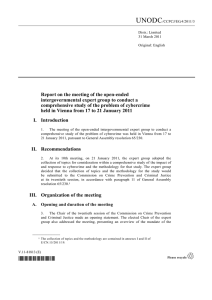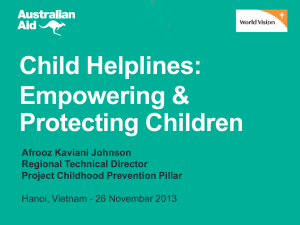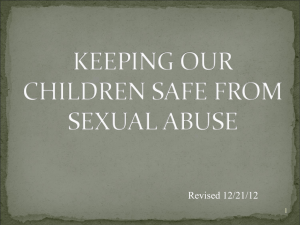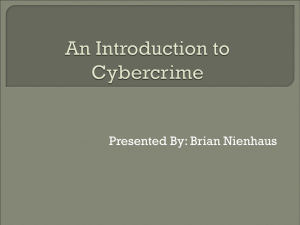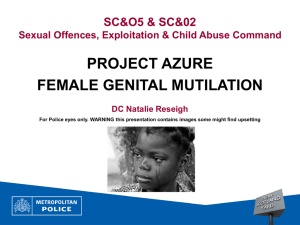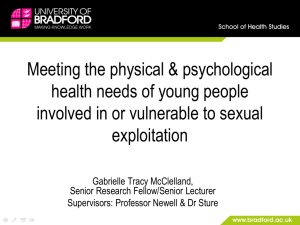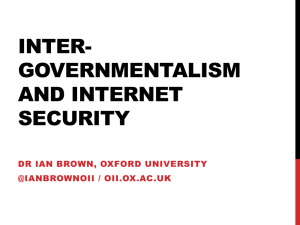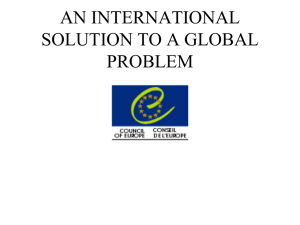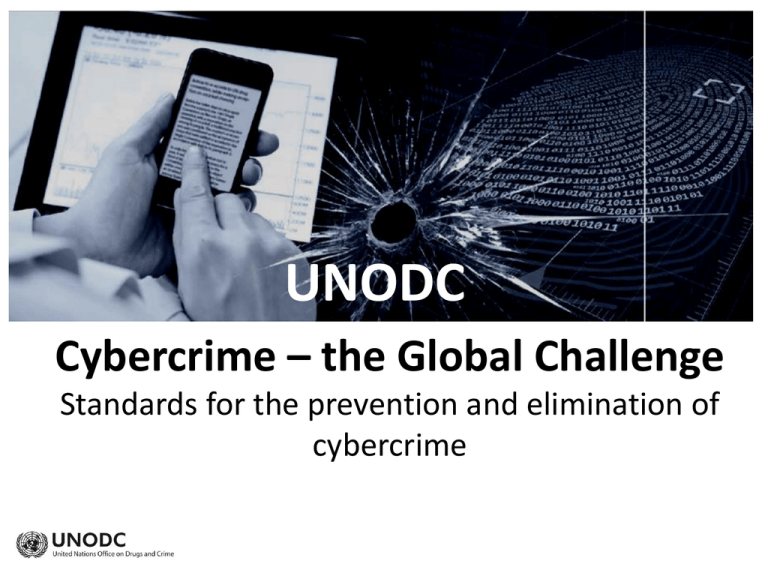
UNODC
Cybercrime – the Global Challenge
Standards for the prevention and elimination of
cybercrime
UNODC Cybercrime Mandates
2009: General Assembly Resolution 64/179
Explore ways and means of addressing cybercrime
2010: General Assembly Resolution 67/189
Comprehensive study on cybercrime
2011: Commission on Crime Prevention and Criminal Justice Resolution 20/7
General Assembly Resolution 65/230
Provide cybercrime technical assistance and training
2011: ECOSOC Resolution 2011/33
Produce a study facilitating the identification, description and evaluation of the
effects of new information technologies on the abuse and exploitation of
children
Assess the needs of States for training in investigation of these offences
Design a technical assistance programme to meet those needs
2013: Continued work on the study and strengthened partnerships
The Global Challenge
Compared to the investigation, prosecution and adjudication of ‘conventional’
crimes (such as homicide or robbery), the involvement of a computer, mobile
phone, or computer data in a crime event, presents at least three key
challenges:
Access to evidence – Evidence of cybercrime exists in electronic form.
The lifetime of such evidence varies enormously
The physical location of evidence also varies.
Relevant evidence may be contained within vast quantities of non-relevant
data, and that electronic evidence can be subject to encryption.
Handling evidence – Electronic evidence requires careful handling in order to
ensure that it meets the necessary standards for use in court.
Identifying the perpetrator – The Identification of the perpetrator(s) can
represent a significant challenge.
UNODC Approach: The Global Programme on
Cybercrime
UNODC Global Programme on Cybercrime Objective: to assist developing
countries to prevent and combat cybercrime through a global, sustainable and
holistic approach
Combatting the problem
International and
International law increasingly recognizes
that children deserve special protection.
regional instruments
National laws and policies
International cooperation
States vary considerably in approaches to
addressing forms of child abuse and
exploitation. While many States criminalize
acts such as production of child sexual
abuse material, they may differ with
respect to elements of the crime and
definitions of “child”.
Tools and mechanisms for international
cooperation include mutual legal assistance
treaties, direct law enforcement cooperation,
multi-agency partnerships, forums for
information-sharing and informal direct law
enforcement cooperation.
Combatting the problem
Investigation of offences
Private sector responses
Civil society responses
Specific tools can be employed for detection
and investigation: digital forensic techniques,
automated search, image analysis and image
databases, data mining and analytics.
Electronic service providers may engage in this
respect through varying degrees of selfregulation, including by internet service
providers, self-monitoring by travel and
tourism companies and the creation of
financial coalitions.
Parents, guardians, child educators and civil
society are a further vital component in
combating the problem, including in
supporting children in understanding and
handling online risks, the “flagging” of certain
material online, the creation of telephone
hotlines for reporting, and contributions
towards education and psycho-social methods
of prevention.
International Instruments to combating ICTFacilitated sexual abuse and exploitation of
children
1. United Nations Convention on the
Rights of the Child (CRC)
2. The Optional Protocol to the CRC on
the Sale of Children, Chilf Prostitution,
and Child Pornogrphy
3. United Nations Convention Against
Transnational Organized Crime
4. The Protocol to Prevent, Suppress, and
Punich Trafficking in persons, Espcially
Women and Children
5. Guidelines on Justice in Matters
Involving Child Victims and Witnesses
of Crime
Prevention, invetigation and
prosecution of any “serious
crime”- includes the the use of
ICTs to abuse ir exploit children.
Develop training fo combatting
crimes through the use of
computers…
It renders irrelevant the consent
of any child victim of the practice
of trafficking in persons
Regional Instruments to combating ICTFacilitated sexual abuse and exploitation of
children
1. Council fo Europe Convention
on Cybercrime
Aims to provide a common
criminal policy. Art.9 deals with
offences realted to child
pornography.
2. Council of Europe Convention
on the Protection of Children
against sexual exploitation and
sexual abuse
Aims to prevent and combat
sexual exploitation and sexual
abuse of children…
3. African Charter on the rigths
and walfare of the Child
Protect children from all forms of
sexual exploitation and sexual
abuse
Regional Instruments to combating ICTFacilitated sexual abuse and exploitation of
children (Child pornography)
1. Commonwealth Model Law (art.10)
2. EU Dierctive on Child Explotoitation (art.15)
3. ITU/CARICOM/CTU Model Legislative (art.13)}
4. League of Arab States Convention (Art.12)
5.Draft African Union Conventio (art.9)
National Law
National Law
National Law
National Law
National Law
Assessment of the training needs of States
Identification of crimes
- Lack of dedicated staff trained in all aspects of
ICT- Facilitated child abuse and exploitation
cases.
-Training for personnes may best take place on
a inter-agency basis
-The investigation of ICT- F child abus
tended to be reactive in nature,
rather than proactive.
-States requiere a clear legal
framework taht regulates undercover
operations.
Less 1% of all polices are
specialists in cybercrime.
El Salvador have only one
forensic examiner
Assessment of the training needs of States
Investigative capabilities and electronic evidence
- Lack of ability to obtain stores or real- tiem data on traffic
content.
-Service providers require due legal process for disclosure
of customer data.
-Lack basic sufficient material resources, hardware,
software and internet.
-Specialized training for prosecutors and judges in handling
digital evidence is a need.
In El Salvador the
Internet Services
Providers only
stores datas for
maximun of 3
months (they said
don not have
enough space)
International cooperation
- Lack of standard operating procedures for requests involving digital
evidence
- Lack of contacts in requested countries (some use the diplomatic via)
Assessment of the training needs of States
Victim assistance and awareness raising
- Absence of standard protocols for supporting victimis through the investigative
process, techniques for interviewing victims and collection and preservation of victimrelated evidence
-Lack of awarnes among children, families and sociaty in respect
cyberbullying, sexual harassment- constitus a criminal offence or not.
of whether–
-Need to promote awarness
Policy and coordination
-The development of an overarching national law, policy or strategy against ICTfacilitated child abuse and axploitations with clear priorities and targets can greatly
contribute to a sustainable, coordinated effort against such offences.
-Urgent need for senior officials in the criminal justice field to be aware of such
problems and the importance of digital evidence in investigations.
UNODC technical assistance programme
to prevent and combat technology-facilitated
child abuse and exploitation
Law enforcement training
-Training on specialized methods for
investigatin online crimes (types of crimes,
offender and victim profile, international
image chcking, assistence to victimsl, and
rights of the children.
-Support the authorities in establishing the
necessary structures for the effective
operation of police.
-Support to strenghthening cooperation
with internet service providers.
-training on human rights aspects of law
enforcement investigations
International cooperation
-Support to authorities responsible for
preparing and sending and receiving and
implemting mutual legal assistance requests
Training for prosecutors and judges
-Training for prosecutors and judges on
protection considerations where child
victims are required to testify
UNODC technical assistance programme
to prevent and combat technology-facilitated
child abuse and exploitation
Awareness raising
-Public awareness-raising campaigns.
Develope an awarness raising toolkit.
Sustainability
Mecahnism to ensure the
sustainability of support may include
the accreditation fo training courses
with national police academies and
other relevant institutions.
Thank you
Bertha Nayelly Loya
Officer Research
Bertha.loya@unodc.org
http://www.unodc.org/unodc/en/organized-crime/emerging-crimes.html
+(503) 22 48 88 25


